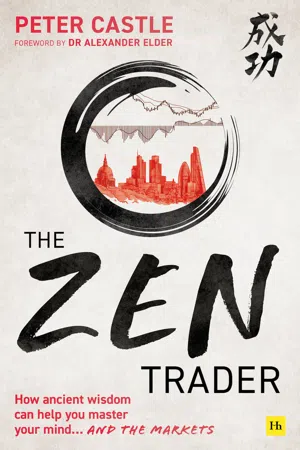
The Zen Trader
How ancient wisdom can help you master your mind and the markets
- English
- ePUB (mobile friendly)
- Available on iOS & Android
About this book
Trading is a stressful occupation, with mental and emotional traps on every side. Our instincts drive us to self-destruction: holding plummeting stocks in the hope of a sudden recovery, or obsessing over the minute-to-minute movements of our holdings.What if there were a trader who knew how to avoid these traps, and could teach us to trade from a place of inner calm and peace of mind?Peter Castle has been a successful trader in financial markets for almost 30 years. He also happens to be a Zen monk. Peter's unique perspective gives him unrivalled insight into how the wisdom of Zen can empower us to master our minds, and so achieve success in the markets.Many guides to using Zen avoid clear prescriptions and rely instead on cryptic quotes. In The Zen Trader, Peter demystifies both trading and Zen, using decades of experience, sharing dozens of real-life examples, and explaining clearly the systems that enable mastery of both disciplines.He teaches us how to limit distraction, focus attention, detach from problematic emotions, be true to ourselves, and embrace the unlimited opportunities that exist in our professional and personal lives.Following Peter's wisdom, you too can become a Zen Trader.
Frequently asked questions
- Essential is ideal for learners and professionals who enjoy exploring a wide range of subjects. Access the Essential Library with 800,000+ trusted titles and best-sellers across business, personal growth, and the humanities. Includes unlimited reading time and Standard Read Aloud voice.
- Complete: Perfect for advanced learners and researchers needing full, unrestricted access. Unlock 1.4M+ books across hundreds of subjects, including academic and specialized titles. The Complete Plan also includes advanced features like Premium Read Aloud and Research Assistant.
Please note we cannot support devices running on iOS 13 and Android 7 or earlier. Learn more about using the app.
Information
Table of contents
- Title
- Copyright
- Dedication
- Contents
- Preface
- Foreword by Dr Alexander Elder
- Introduction
- Chapter 1 – The Two Obstacles to Your Trading Success
- Chapter 2 – Zen Is the Solution to the Second Obstacle
- Chapter 3 – Obstacles of Logic
- Chapter 4 – The Buddha Had a System
- Chapter 5 – Correct Understanding of Attachment Produces Clarity of Thought
- Chapter 6 – The Zen Secret to Developing Non-Attachment
- Chapter 7 – The Objective of Zen
- Chapter 8 – Mindfulness Alone Is Not Zen
- Chapter 9 – Being in Control and Suppressing Fear Is Not the Solution
- Chapter 10 – The Zen System for Peace of Mind and Profit
- Chapter 11 – Meditation, the Zen System’s Most Important Rule
- Chapter 12 – Measuring Peace of Mind
- Chapter 13 – Identity, the Self and Ego
- Chapter 14 – I Want Money, Not Zen
- Chapter 15 – Your Required Schedule to Make Money
- Chapter 16 – Zen Has the Answer to Don’t Know
- Chapter 17 – Simple Practices for Complicated Processes
- Chapter 18 – The Final Word on Mastery
- Bibliography
- Acknowledgements